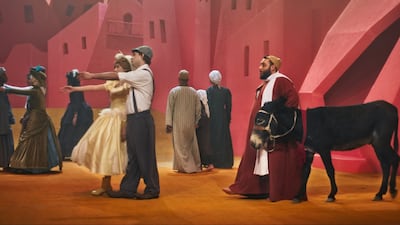Wael Shawky’s video installation Drama 1882 (2024), one of the highlights of this year's Venice Biennale, is going global. After marking its North American premiere at the Toronto International Film Festival on Friday, it is heading to the International Documentary Film Festival in Amsterdam. In November, the piece will be screened at the Public Art Abu Dhabi Biennial.
The 45-minute film was produced for the Venice Biennale's Egyptian pavilion, earning critical acclaim from arts industry publications. Queues reportedly stretched through the Giardini to see Shawky’s reimagining of a 19th-century encounter between the Egyptian nationalist Col Ahmed Urabi and the British imperialists he and others were attempting to depose.
Following its success, Shawky tells The National: "I found it amazing that many nationalities at the biennale found their own stories in modern Egyptian history. Even Koreans who visited the pavilion told me that it reminded them of their Korean/Japanese war."
Shawky, who lives in Alexandria, is known for reaching into history and re-examining accepted narratives, highlighting their biases and omissions. Drama 1882 continues in this vein by looking at the well-known Urabi Revolt from the perspective of the Egyptian people.
It also demonstrates an artistic departure. The artist typically uses distancing elements in this work to signal the fact that the viewer is watching a story, told in one particular way, from history. But for Drama 1882, he worked with real actors (and a real donkey), filming the work in Alexandria’s open-air theatre.
“For all the previous films, I was always trying to escape drama, by using marionettes or kids or masks,” he said at the time. “This time, I felt it was a challenge to connect history to theatre.”
Still, stylisation reigns supreme for the work. The entire story is sung in classical Arabic, which the actors perform theatrically in slow-motion, rocking back and forth to signal a conversation, or very slowly making gestures to express their emotions. The effect is mesmerising. Watching it, one has the feeling of being pulled under and into the story, in which Uraibi faces exploration and treason that he cannot surmount.
The work was Shawky’s first major project for Egypt in recent years and was made with a groundswell of support from the local Alexandrian arts scene. The crew filmed through the Egyptian winter, and in some scenes, one can see the actors’ breath as they braved adverse conditions to pull off the making of the film.
Global state-owned investor ranking by size
|
1.
|
United States
|
|
2.
|
China
|
|
3.
|
UAE
|
|
4.
|
Japan
|
|
5
|
Norway
|
|
6.
|
Canada
|
|
7.
|
Singapore
|
|
8.
|
Australia
|
|
9.
|
Saudi Arabia
|
|
10.
|
South Korea
|
Defence review at a glance
• Increase defence spending to 2.5% of GDP by 2027 but given “turbulent times it may be necessary to go faster”
• Prioritise a shift towards working with AI and autonomous systems
• Invest in the resilience of military space systems.
• Number of active reserves should be increased by 20%
• More F-35 fighter jets required in the next decade
• New “hybrid Navy” with AUKUS submarines and autonomous vessels
Dates for the diary
To mark Bodytree’s 10th anniversary, the coming season will be filled with celebratory activities:
- September 21 Anyone interested in becoming a certified yoga instructor can sign up for a 250-hour course in Yoga Teacher Training with Jacquelene Sadek. It begins on September 21 and will take place over the course of six weekends.
- October 18 to 21 International yoga instructor, Yogi Nora, will be visiting Bodytree and offering classes.
- October 26 to November 4 International pilates instructor Courtney Miller will be on hand at the studio, offering classes.
- November 9 Bodytree is hosting a party to celebrate turning 10, and everyone is invited. Expect a day full of free classes on the grounds of the studio.
- December 11 Yogeswari, an advanced certified Jivamukti teacher, will be visiting the studio.
- February 2, 2018 Bodytree will host its 4th annual yoga market.
Stats at a glance:
Cost: 1.05 billion pounds (Dh 4.8 billion)
Number in service: 6
Complement 191 (space for up to 285)
Top speed: over 32 knots
Range: Over 7,000 nautical miles
Length 152.4 m
Displacement: 8,700 tonnes
Beam: 21.2 m
Draught: 7.4 m
Global institutions: BlackRock and KKR
US-based BlackRock is the world's largest asset manager, with $5.98 trillion of assets under management as of the end of last year. The New York firm run by Larry Fink provides investment management services to institutional clients and retail investors including governments, sovereign wealth funds, corporations, banks and charitable foundations around the world, through a variety of investment vehicles.
KKR & Co, or Kohlberg Kravis Roberts, is a global private equity and investment firm with around $195 billion of assets as of the end of last year. The New York-based firm, founded by Henry Kravis and George Roberts, invests in multiple alternative asset classes through direct or fund-to-fund investments with a particular focus on infrastructure, technology, healthcare, real estate and energy.
THE CLOWN OF GAZA
Director: Abdulrahman Sabbah
Starring: Alaa Meqdad
Rating: 4/5
The Perfect Couple
Starring: Nicole Kidman, Liev Schreiber, Jack Reynor
Creator: Jenna Lamia
Rating: 3/5
UAE currency: the story behind the money in your pockets




